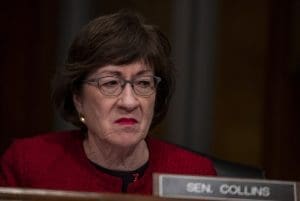Susan Collins is mad about 'dark money' ads. But she's the reason they're legal.
Collins was the deciding vote in 2010 against the DISCLOSE Act, which would have required transparency for political ads.

Sen. Susan Collins (R-ME) reportedly complained Saturday about dark money advertisements being run against her. But a decade ago, Collins was the deciding vote against a bill that would have brought transparency to political ads like the ones she now abhors.
According to a report in the Lewiston Sun Journal, Collins “griped that she’s been assailed with dark money advertising that reaches ‘new depths of falsehood.'” In her closed-door remarks to attendees at the Androscoggin Republican Committee’s annual Lincoln Day dinner, she objected specifically to ads accusing her of cutting Medicare.
But back in 2010, following the Supreme Court’s controversial Citizens United ruling, Congress considered legislation to require tax-exempt organizations that run ads supporting (or opposing) political candidates publicly identify contributors who funded the ads. The Democracy is Strengthened by Casting Light on Spending in Elections Act — with the acronym DISCLOSE — passed the House of Representatives that May.
When the Senate voted on its version of the bill two months later, it ran into a Republican filibuster. Collins opposed the bill, calling it “another example of election year politics” and complaining that it would “provide a clear and unfair advantage to unions” who could spend their treasury funds on ads without disclosing their members.
That September, a pared-down version was brought up that tried to address these and other criticisms. It too was blocked by the Senate’s GOP minority. On a 59-39 vote, the bill came one vote short of the required three-fifths threshold needed to end debate. Collins voted no, making her the decisive vote to kill the legislation.
Since then, Republicans have successfully blocked all subsequent attempts to require disclosure for dark money advertisements. Thanks to Collins and her colleagues, outside groups continue to spend millions of dollars on political ads — and voters often have no way to evaluate who is behind them.
Asked about the contradiction, a Collins spokesperson said in an email that she “has worked for greater transparency in our campaign financing system” and “opposed the DISCLOSE Act because, as even the ACLU said, the legislation was flawed.”
While Collins does not like the ads against her, she has benefited often from similar spending on her behalf. In recent months, for example, a dark money outfit called One Nation has spent hundreds of thousands on ads praising Collins for her work against diabetes.
Collins faces a tough reelection this November, as recent polling found her to be the nation’s least popular senator in the country.
Updated with a comment from Sen. Susan Collins’ office.
Published with permission of The American Independent Foundation.
Recommended

New NC GOP chair flirts with bogus stolen election conspiracies
Simmons predecessor was a staunch 2020 election denier
By Jesse Valentine - April 19, 2024
Texas activists pushed abortion restrictions in NM cities and counties, records show
Emails reveal influence and control in exchange for promises of legal help
By Austin Fisher, Source NM - March 04, 2024
Cannabis workers across Missouri begin push to unionize dispensaries
The first day was a breeze. Sean Shannon and Danny Foster walked into several marijuana dispensaries around Missouri with their matching “Union For Cannabis Workers” shirts and talked to employees about the possibility of unionizing. “The first day, there were 57 stops amongst the teams,” said Shannon, lead organizer with UFCW Local 655, which actually […]
By Rebecca Rivas - December 04, 2023










































































